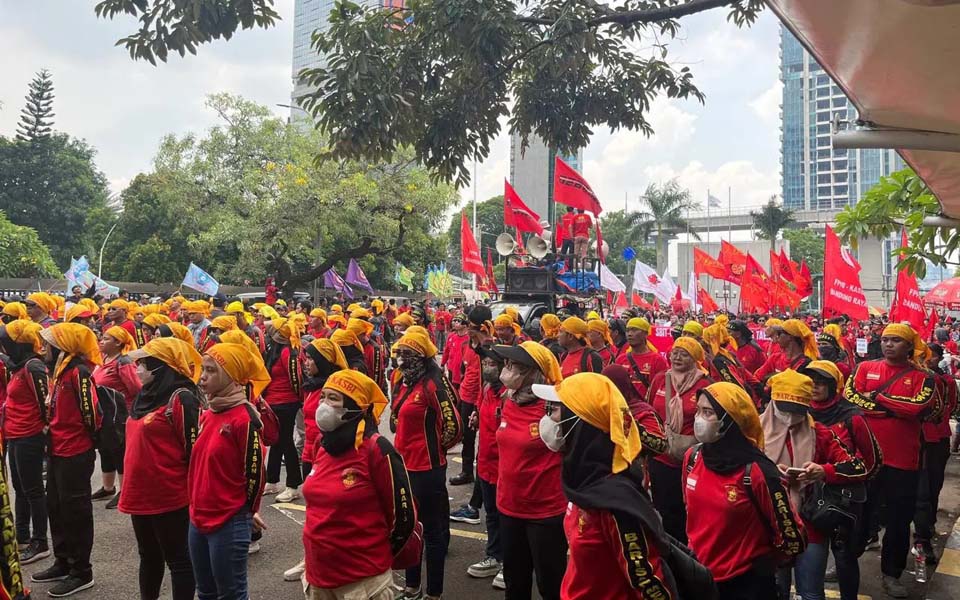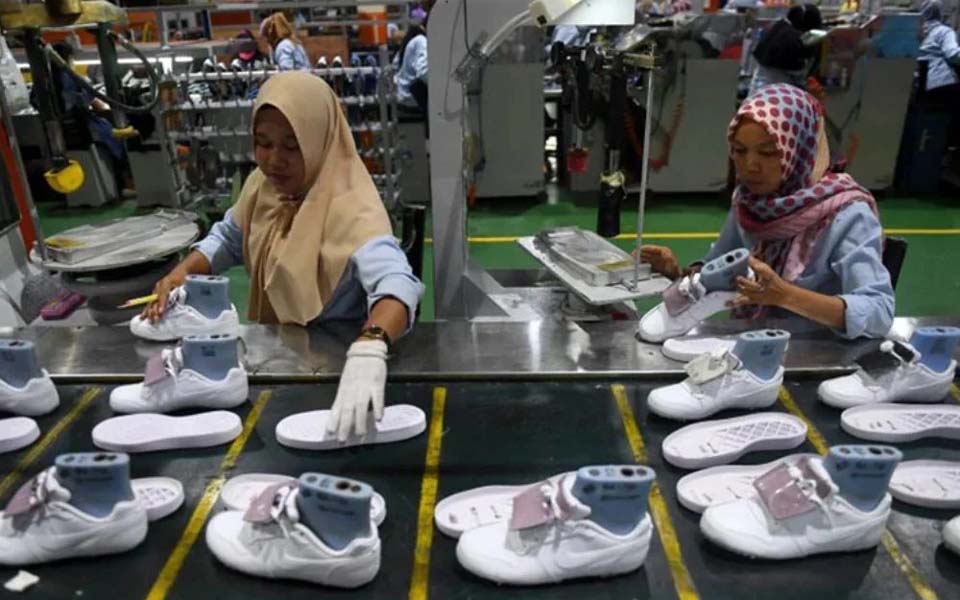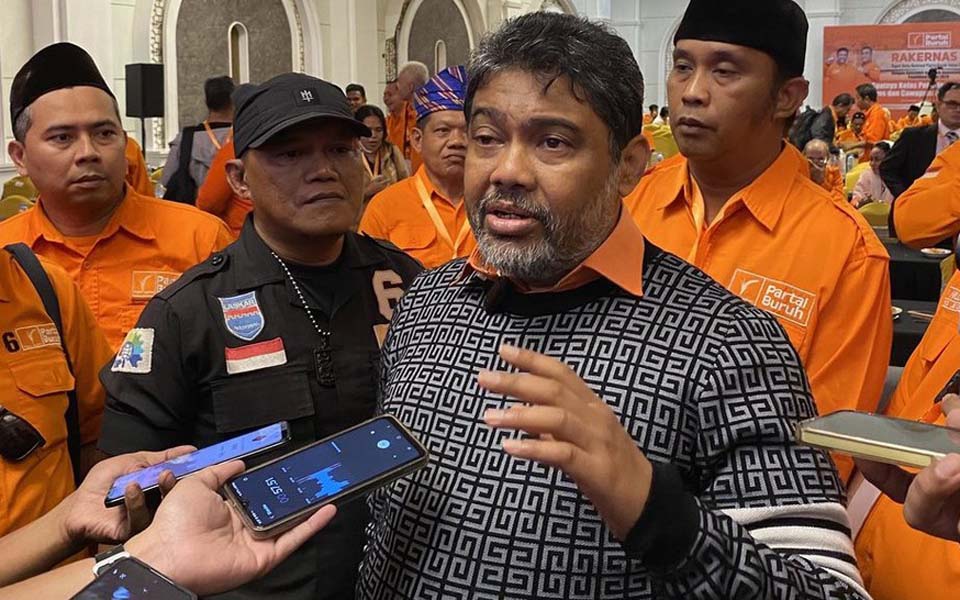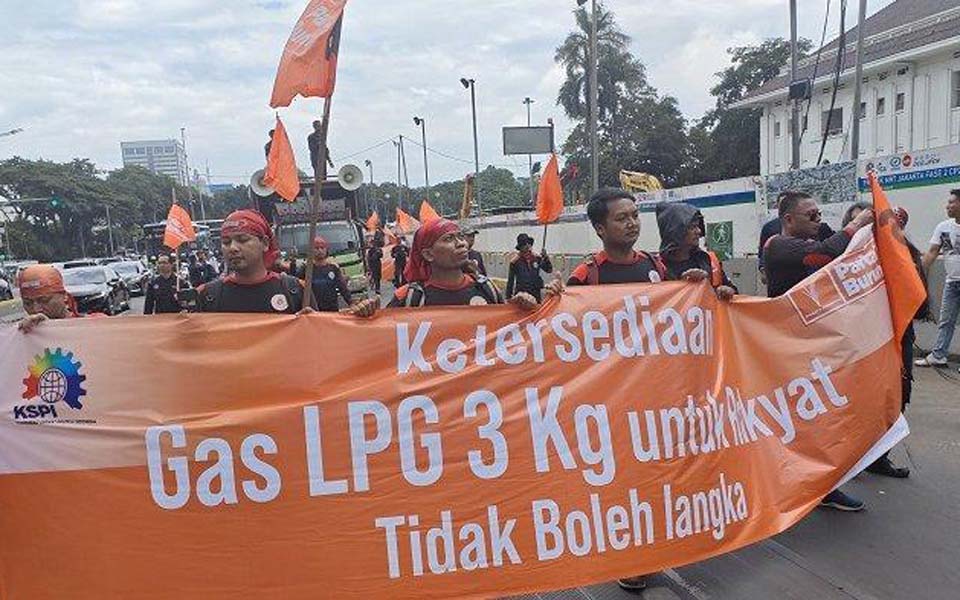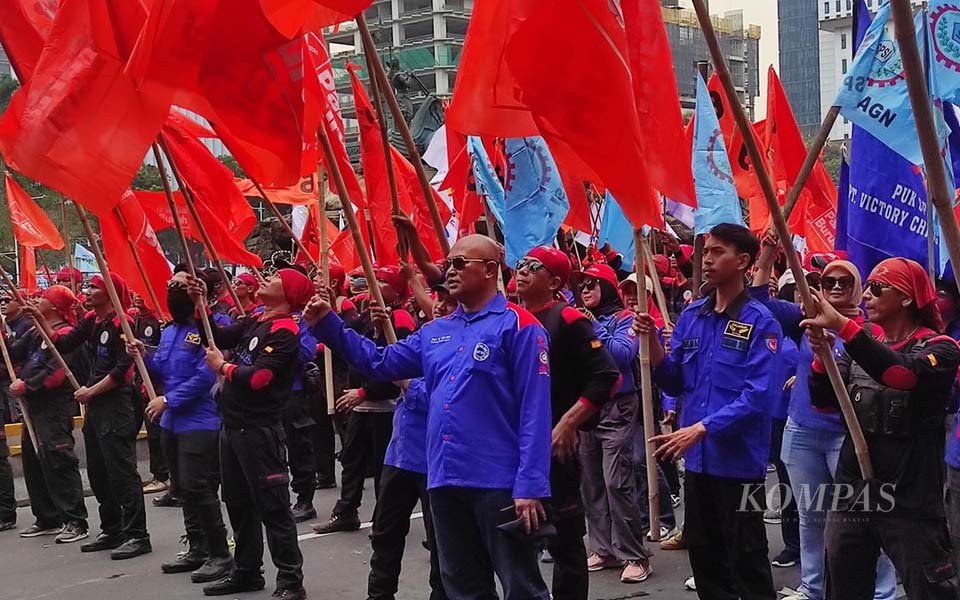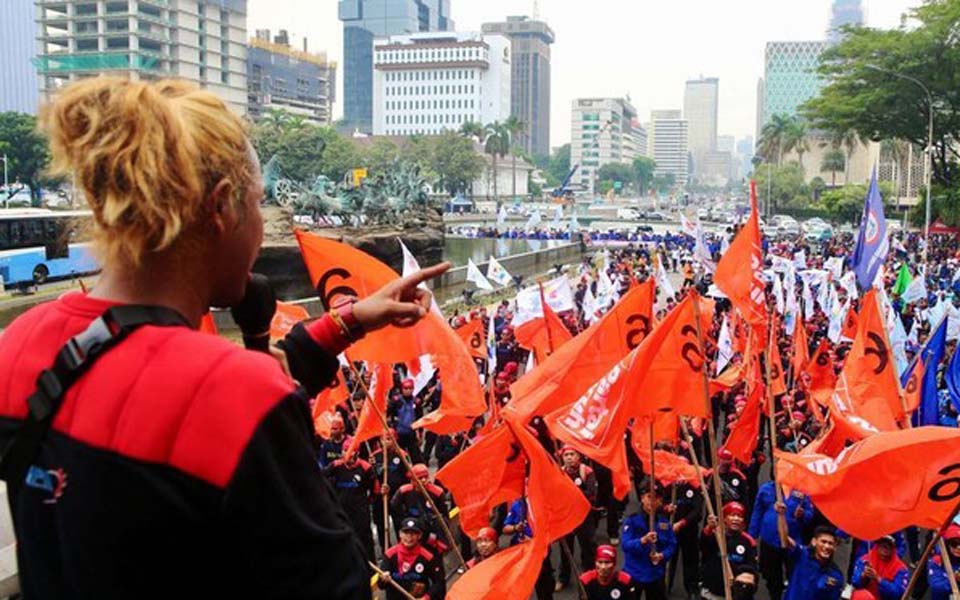[The following is a statement by the Labour Movement with the People (GEBRAK) that was issued during a protest action at the Ministry of Labour offices in Jakarta on November 20, 2024.]
Jakarta – The Labour Movement with the People (GEBRAK) has found that the current minimum wage being received by workers is inadequate because it is insufficient to meet real household needs. As a result, household debts are growing and workers are becoming increasingly vulnerable.
Based on this, the GEBRAK Alliance is demanding an increase in the 2025 national minimum wage of 25-30 percent. This demand was made during a demonstration at the Ministry of Labour offices on November 20.
The demand for a 25-30 percent increase in the 2025 minimum wage is also being made in the context of the many economic policies in this country that tend to protect employers regardless of the conditions faced by the ordinary people, especially workers.
We need to remember that during the Covid-19 pandemic in 2021 and 2022, wages in some regions did not increase at all. Yet expenditure and living costs for workers and their families increased significantly, but wages were not increased.
In 2023 the government through the Labour Ministry issued Labour Ministry Regulation (Permenaker) Number 5/2023 on the adjustment to working hours and wages in labour intensive industries, the aim of which was to cut wages in labour intensive sectors by 25 percent of the prevailing regency or municipal minimum wage (UMK).
This move by the state actually resulted in many workers falling into abyss of structural poverty and added a new burden to be borne by workers.
"We workers work hard day and night, providing benefits for business and have contributed to the Indonesian economy. Since the Covid 19 pandemic our wages have not risen, the impact has been that workers' purchasing power has been very weak for two years which is a consequence of the depressed national economy which resulted in workers become a sacrificial offering. So it is natural that we are now demanding an increase in the 2025 [minimum] wage of more than 20 percent", concluded GEBRAK Presidium Coordinator Sunarno.
A similar view was also conveyed by one of the GEBRAK spokespeople M. Yahya, "The government should not always side with business. For four years the workers have suffered greatly because their wages did not go up. Now, it is natural that we are demanding higher wages. This is also in the interests of the Indonesian economy so that people's purchasing power can be higher. Business will also benefit if wages rise because their goods can be bought by workers", explained Yahya.
GEBRAK has identified that the value of the current low wages are a result of the failure to calculate components covering the Reasonable Living Cost Index (KHL), so wages do not reflect the real needs of workers and a decline in material support from the state in the public interest.
In the 2022 Living Costs Survey released by the National Statistics Agency (BPS), the cost of living for households in Jakarta in 2018 reached 13,453,989.00 rupiah a month and in 2022 it reached 14,884,110.27 rupiah. Meanwhile, the Jakarta UMP in 2018 was 3,648,036 a month and the UMP in 2022 was 4,641,854 a month.
These figures indicate that even for families with a double income their salary is not enough to support household needs and living costs have reach about three times the UMP. For those who are not yet married, wages are also insufficient to meet their daily needs and they are becoming a "sandwich generation". This is also added to by the problem of freelance workers who are much more vulnerable than permanent workers, plus they have to provide their own work tools.
This situation is exacerbated by the calculation of wage increases which only refers to inflation. Yet the increase in expenditure per year is not just from inflation, but from an increase in other daily costs.
For example, in the midst of the development of today's digitalisation, the need for communication technology is increasing along with other household utilities. But, these additional needs are not accommodated in the annual minimum wage increases. Meanwhile, social security that would be expected to reduce the burden on workers, is actually paid for by the workers themselves such as Social Security Management Agency (BPJS) healthcare contributions and day-care costs.
In addition to this, GEBRAK also sees that the government's common mistake of understanding a decent standard of living as the absolute minimum. Living standards cannot just be represented by real expenditure per capita per year, because real expenditure also includes thing like debt, forcing workers to live a very frugal live because of their small income. This causes workers to be trapped in a vicious circle that reduces their quality of life from year to year. This is evidenced by the data showing a decline in the percentage of people classified as middle-class in Indonesia.
Reflecting on this matter, several labour groups also filed a lawsuit with the Constitutional Court challenging the labour related articles in the Omnibus Law on Job Creation (UU Cipta Kerja). On October 31 the court ruled that there were at least 21 points in the law that are contrary to the 1945 Constitution including the wage system, industrial relations mechanisms, working hours and foreign labour.
The implication of this ruling is that there are two points that should be used as a reference in addition to the current issue of decent wages. First, Government Regulation (PP) Number 51/2023, which only formulates wages based on economic growth and inflation, can no longer be used as a basis for determining wages. Second, the ruling re-establishes sectoral wages. Finally, the political will of the government to fulfil workers' basic rights and create a fair and dignified wage system is due to a lack of current wage regulations.
"Regarding the chaotic wage system in Indonesia that comes up at the end of every year, this should be an important concern for the government. The administration of [President] Prabowo [Subianto] and Vice President Gibran [Rakabuming Raka] should not rely on gimmicks, but it is obliged to produce an Indonesian worker wage policy by involving elements from the trade unions. The Indonesian wage system must be reformed immediately, made fair, dignified and protect workers. So that disputes over normative rights and especially wage violations are no longer massive. Moreover, at this time there is an extraordinary disparity in the wages of workers between different regions, yet the necessities of life of workers between one region and another are not very different", explained Sunarno.
The Constitutional Court's recommendation that the House of Representatives (DPR) draft a new labour law could be used as a momentum to encourage regulations that are more favourable to workers. Including in terms of more humane regulations and wage systems.
Sunarno stated that wages are based on the working relationship between workers and employers, so it is important for us to immediately create a fair and dignified wage law for Indonesian workers.
Based on the above arguments, GEBRAK conveyed the following demands during the demonstration at the Ministry of Labour offices on November 20.
- Increase the 2024 minimum wage by 25-30 percent
- Reject the use of PP 51/2023 as a basis for determining the 2025 minimum wage increase
- Reject wages below the UMP/UMK in labour intensive industries
- Reinstate the sectoral wage in all municipalities and regencies
- Set an UMP/UMK for 2025 based on the Reasonable Living Cost Index
This press release is addressed to all media workers, people's movement alliances, farmers' movement alliances, student movement alliances and labour alliances in all regencies and municipalities.
Organisations that are part of the GEBRAK alliance:
- Confederation of Indonesian Trade Union Congress Alliance (KASBI)
- Confederation of United Indonesian Workers (KPBI)
- National Trade Union Confederation (KSN)
- National Labour Movement Centre (SGBN)
- Media and Creative Industries Trade Union for Democracy (Sindikasi)
- Banking Trade Union Communication Network (Jarkom SP Perbankan)
- Agrarian Reform Consortium (KPA)
- Progressive Students School (SEMPRO)
- Indonesian Student Union (SMI)
- National Student League for Democracy (LMID)
- Indonesian High-School Students Federation (FIJAR)
- Jakarta Legal Aid Foundation (LBH Jakarta)
- Indonesian Legal Aid Foundation (YLBHI)
- United People's Struggle (KPR)
- Indonesian Workers Federation of Struggle (FPBI)
- Food and Beverage Trade Union Federation (FSBMM)
- Independent Trade Union Federation (FSPM)
- Industry Workers Federation (FKI)
- Indonesian Transport Workers Union (SPAI)
- Indonesian Forum for the Environment (WALHI)
- Greenpeace Indonesia (GP)
- Trend Asia (TA)
- Independent Journalist Alliance (AJI)
- Commission for Missing Persons and Victims of Violence (Kontras)
- College of Law Student Exertive Council (BEM STIH Jentera)
- Campus Employees Union (SPK)
- Amartya House
- Sedane Labour Resource Centre (LIPS)
- Free Women (Perempuan Mahardhika)
- Indonesian Revolutionary Education Committee (KRPI)
- Indonesian Healthcare Workers and Medical Employees Trade Union (KSPMTKI)
- The Socialist Union (PS)
- Student Struggle Centre for National Liberation (PEMBEBASAN)
- United People's Struggle (KPR)
GEBRAK Alliance spokespersons:
- Sunarno (KASBI Confederation), +62 812 8064 6029
- M. Yahya (SGBN), + 62 857 1481 2122
- Herman (United People's Struggle), +62 822 1342 6109
- Ilhamsyah (KPBI), +62 812-1923-5552
- Hermawan (KSN) +62 822-2152-8192
[Translated by James Balowski. Edited slightly for readability. The original title of the article was "Negara Harus Memberlakukan Upah Layak Nasional".]
Source: https://www.arahjuang.com/2024/11/23/negara-harus-memberlakukan-upah-layak-nasional/





